Une journée d'Ivan Denissovitch
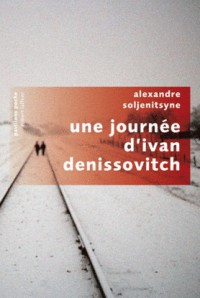 Ivan Denissovitch Choukhov is a one-in-a-million Russian man, one of the many detainees of the Gulags, the famous Russian work camps during the reign of Stalin. 'Une journée d'Ivan Denissovitch' is indeed just one day in the life of good old Ivan. Basically, this means we get a lot of descriptions of what Ivan Denissovitch does, how he does it, why he does it, what he wants to do and why he can't do the latter. But what happens near the end? Ivan starts to talk!
Ivan Denissovitch Choukhov is a one-in-a-million Russian man, one of the many detainees of the Gulags, the famous Russian work camps during the reign of Stalin. 'Une journée d'Ivan Denissovitch' is indeed just one day in the life of good old Ivan. Basically, this means we get a lot of descriptions of what Ivan Denissovitch does, how he does it, why he does it, what he wants to do and why he can't do the latter. But what happens near the end? Ivan starts to talk!I honestly wouldn't recommend reading most of this book, but I have to admit I was caught off guard by the ending. Solzhenitsyn delayed giving Denissovitch a human face until the end, and the conversation between Ivan and Aliochia is all the more striking because of this. I actually felt for Ivan. He seems like a nice bloke, a man who can find happiness in the absence of Even More evil. His happiness is the absence of punishment, the little loops in the net. Which gives this book a poignancy that I hadn't expected any more.
Furthermore - why does Solzhenitsyn, after leaving the camps himself, keep writing about them? His mind must have still been imprisoned. Perhaps there is joy to find in the absence of society. Can the camps be positive? It begs the question.
India Song
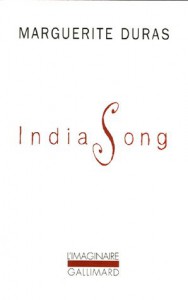 Yes indeed, Marguerite Duras is a French literary Lars Von Trier, willingly dropping the reader into a state of doubt and unease. 'India Song' continues upon the story of [b:The Ravishing of Lol Stein|280|The Ravishing of Lol Stein|Marguerite Duras|https://d202m5krfqbpi5.cloudfront.net/books/1367749732s/280.jpg|378707] and is equally vague and disturbing.
Yes indeed, Marguerite Duras is a French literary Lars Von Trier, willingly dropping the reader into a state of doubt and unease. 'India Song' continues upon the story of [b:The Ravishing of Lol Stein|280|The Ravishing of Lol Stein|Marguerite Duras|https://d202m5krfqbpi5.cloudfront.net/books/1367749732s/280.jpg|378707] and is equally vague and disturbing. In 'India Song', the story of Michael Richardson and Anne-Marie Stretter is elaborated upon. (Hey, at least Richardson is consistent in his choice of women. Stretter is a nutcase as well!). In true Duras style, nothing is really clear in this book. In fact, the story (if there is any to be told) is delivered by a variety of voices that have their own interests at heart. They are far from omniscient, trustworthy or consistent and this, of course, has its repercussions for the general experience of the book as well.
'India Song', in the end, is an intriguing little book/play, which succeeds in describing some very visceral scenes, but which is also very empty. There's nothing to describe, really. I'm out of words.
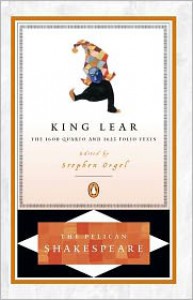 There is an abundance of reviews, essays, opinions and prejudicial comments available when talking about Shakespeare. It would seem that the man was incapable of jotting down a bad sentence, let alone a bad story, at least, that's the veil they hand you when calling Shakespeare, morbidly referred to as 'Willy' by those who know the first three lines of Hamlet's 'to be or not to be'-speech, 'the greatest writer of all time'.
There is an abundance of reviews, essays, opinions and prejudicial comments available when talking about Shakespeare. It would seem that the man was incapable of jotting down a bad sentence, let alone a bad story, at least, that's the veil they hand you when calling Shakespeare, morbidly referred to as 'Willy' by those who know the first three lines of Hamlet's 'to be or not to be'-speech, 'the greatest writer of all time'. In this review, I shall not beshame my opinion by calling anyone Willy, Shakey, Quilly or by using the word 'Shakespearean'. 'King Lear' is not the strongest play in the exuberant repertoire of Shakespeare. It is, however, one of the more reader-friendly ones, which means you don't need a detailed map of familial relations to follow the plot. The story of King Lear relies heavily on stories that already existed at the time, but had only served as traditional folk tales or as long forgotten myths. For those who are oblivious to the plot - King Lear wants to divide his kingdom between his three daughters, Goneril, Regan and Cordelia. Whereas Goneril and Regan go out of their proverbial ways to flatter their father, Cordelia remains reticent (but honest). Which, of course, is not much appreciated. What follows resembles the story of Oedipus, that other Blind King who slowly wandered into his own destruction. Gloucester, one of the side characters, actually does lose his eyes.
'King Lear', in the end, is a reflection on power and what one will do to achieve it. Even though it might be a bit stale nowadays, it still holds true to its message, and for those who enjoy Shakespeare's husky metaphor, this play will provide you with all the ammunition needed.
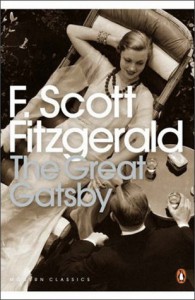 Five stars. Ten stars. All the stars.
Five stars. Ten stars. All the stars. Gatsby reached for the stars, balancing his enchantements to the intensity of his heart. Writing some of the most brilliant prose, Scott Fitzgerald makes Romeo and Juliet look like two sullen little children, unworthy of the dream of everlasting love.
My favourite book. End review.
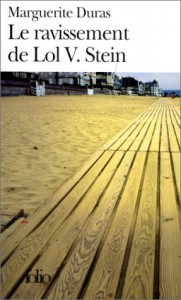 The writing of Marguerite Duras reminded me of movies such as 'Festen' and 'Melancholia'. It seems detached from reality, empty even, and the more you read, the more the whole book seems to disappear. 'Le Ravissement de Lol V. Stein' is not an easy book to read, but it is a very strong intellectual stimulus. We are talking about an author who wrote a book that had a clear meaning, but then decided to scratch out all the words that assured some clarity.
The writing of Marguerite Duras reminded me of movies such as 'Festen' and 'Melancholia'. It seems detached from reality, empty even, and the more you read, the more the whole book seems to disappear. 'Le Ravissement de Lol V. Stein' is not an easy book to read, but it is a very strong intellectual stimulus. We are talking about an author who wrote a book that had a clear meaning, but then decided to scratch out all the words that assured some clarity.We are talking about a character that is called Lol V. Stein (not the most sexy name for a character) who likes to be the ignored corner of a triangular relationship. We are also talking about trauma without the presence of pain. In fact, what is this book all about? Lol is left by her husband, but seems to find a sort of perverted pleasure in him taking off with another woman. She then tries to recreate this whole scenario by manipulating the lover of her best friend, who also happens to be the narrator.
I'll come back to this review after I've analysed this book in my French class, but for now, all I can say is that usually I have strong feelings after finishing a book. Either very positive, very negative or very neutral. This book is like the somewhat creepy, silent kid that was always in your class, the faux pas that did have a certain charisma. Very strange, very intruiging.
 Once upon a time, a younger version of this lovely reviewer went to a theater somewhere in the north of France and was witness of a French reproduction of 'L'écume des jours'. The show was a marvellous mix of conversations between cats and mice, flowers, hilarious church services and heartwrenching romance. The thing was, though, that I didn't feel like I understood what I had just seen. My French was lacking at the time, but even so, I felt like I had witnessed something special.
Once upon a time, a younger version of this lovely reviewer went to a theater somewhere in the north of France and was witness of a French reproduction of 'L'écume des jours'. The show was a marvellous mix of conversations between cats and mice, flowers, hilarious church services and heartwrenching romance. The thing was, though, that I didn't feel like I understood what I had just seen. My French was lacking at the time, but even so, I felt like I had witnessed something special.A few years later I find myself reading the paper version of 'L'écume des jours'. I had almost forgotten about the theater I once saw. But I must admit that the book is, in many ways, the same thing. A collection of marvels that still, I do not fully understand. But how essential it all seems! There's something special that happens when Chloé is stricken by her amazing illness; a flower is growing inside her lungs. (Seriously though - this is reason enough to read the book.)
'L'écume des jours' is a crazy contemplation, but above all, a very rhythmical and spontaneous representation of love, responsibility and god knows what else. As I've already said, this book isn't meant to be understood. One can solely admire the intensity it brings to the table and say, bravo monsieur Vian, bravo.
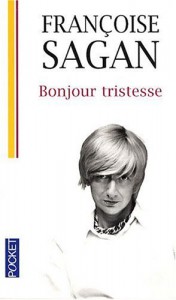 So what happens when a spoiled teenager is forced to grow up and refuses her new stepmother? Apparently, some pretty evil shit. Cécile is not happy with the rigid lifestyle of her new mater familias Anne and doesn't waste a single opportunity to show her disdain. Even though she admires the consistency and upper class aesthetics of Anne.
So what happens when a spoiled teenager is forced to grow up and refuses her new stepmother? Apparently, some pretty evil shit. Cécile is not happy with the rigid lifestyle of her new mater familias Anne and doesn't waste a single opportunity to show her disdain. Even though she admires the consistency and upper class aesthetics of Anne.I would say that this book is interesting because of the opposition between quick passions, represented by Elisa and the father of Cécile, and the long-lasting engagement of a real relationship. I would say that this book is interesting because of this reason, but certainly not groundbreaking. No earthquakes here.
I can't even be bothered to write a decent review here. Nothing spectacular. Go read Boris Vian.
 '99 francs' is a very enticing read. Beigbeder, who used to work as a publicitary agent, wrote a vehement attack on the world of billboards, catchy slogans and consumerism. And what's even more - it's pretty damn funny.
'99 francs' is a very enticing read. Beigbeder, who used to work as a publicitary agent, wrote a vehement attack on the world of billboards, catchy slogans and consumerism. And what's even more - it's pretty damn funny.We follow the adventures of a publicity hotshot called Octave, who is writing down his story in an attempt to get fired from his job. Everything he does to get himself fired backfires though, resulting in a promotion, big bonuses and bigger contracts. It's a world where vile slogans get rewarded, where manipulation is key to succes and, more importantly, the world we all live in today. There's also a more romantic side to the story. Octave is trying to escape. He doesn't really know how he is supposed to go about that, but still. There's some really nice French in here. This book is dangerous, but essential.
Beigbeder is a writer pur sang - go check it out.
De karaokeoorlog / druk 1
 I can't imagine what it must be like to always be in the shadow of your namesake. Haruki Murakami, famous novelist, has indeed somewhat eclipsed the literary career of Ryu Murakami, although this is in no means a statement of quality. Apart from the fact that they are both Japanese people named Murakami, they actually have little in common.
I can't imagine what it must be like to always be in the shadow of your namesake. Haruki Murakami, famous novelist, has indeed somewhat eclipsed the literary career of Ryu Murakami, although this is in no means a statement of quality. Apart from the fact that they are both Japanese people named Murakami, they actually have little in common.As usual, Ryu Murakami writes a novel that is based around sensational events and Tarantino-esque characters that balance on the edge of good reason. You really just have to go along with it. The interesting thing is that these events shake up the lives of the characters in such a way that it allows for Murakami to really explore how the human mind responds to things that are 'out of place'. In many ways, the violence is a way to liberate oneself from the restrictions of society. Of course this is merely symbolic; Murakami is hardly an advocate of violence, I might imagine. But still - it's an interesting idea that works out well in this novel.
The story revolves around a confrontation between two groups of people - an emotionally detached group of young men and a group of lonely, scared wives in their thirties. Their obvious differences are used to address issues more central to Japanese society, such as the dangers of neglect and detachment. I felt it difficult to put down this novel - it's extremely high-paced and often disturbingly funny.
I would recommend Ryu Murakami's work to those people who aren't easily shocked by opinions that are deviant or even dangerous. What makes it al the more disturbing, is that this book is essentially a love tale, but one which treats love that is ungiven. Too often the absence of (motherly) love has been eclipsed by romantic boy meets girl stories. And I, for one, am glad there's always books like this that manage to show you the 'other side'.
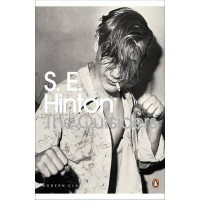 Who writes this stuff at just seventeen? Susan Eloise Hinton wrote this magnificent novel as a symbolic representation of a dangerous social dichotomy that was arising at the time; gangs of young hoodlums who called themselves 'greasers' (think John Travolta and Saturday Night Fever) clashed with the 'Socs', the wealthy but coldhearted upper class youngsters.
Who writes this stuff at just seventeen? Susan Eloise Hinton wrote this magnificent novel as a symbolic representation of a dangerous social dichotomy that was arising at the time; gangs of young hoodlums who called themselves 'greasers' (think John Travolta and Saturday Night Fever) clashed with the 'Socs', the wealthy but coldhearted upper class youngsters. S.E. Hinton first came on my radar after I saw the magnificent movie adaptation of her book 'Rumble Fish', featuring Matt Dillon, a star performance of Mickey Rourke and the ever beautiful Diane Lane. For those of you who have seen this movie, 'The Outsiders' will certainly strike a match. The world S.E. Hinton describes is shady, dark but also beautiful in its own way. The characters and their bonds are very impressive. Even though they are petty criminals, you can't help but feel for Darry, Soda, Johnny and protagonist Ponyboy.
Apart from having a certain romantic appeal (stay gold, Ponyboy, stay gold...) one has to consider the message of this book. I loved how Hinton managed to make every dialogue relevant. Her style is quite extraordinary considering the age at which she wrote all of this. The book is short, but in the end, this is good, because this means nothing stops the rhythm of the book. There's no extra weigth here. Just a supremely confident book.
'The Outsiders' is one of those books that American scholars have to read compulsory, and finds itself in the good company of books such as [b:1984|5470|1984|George Orwell|http://d202m5krfqbpi5.cloudfront.net/books/1348990566s/5470.jpg|153313], [b:The Great Gatsby|4671|The Great Gatsby|F. Scott Fitzgerald|http://d202m5krfqbpi5.cloudfront.net/books/1361191055s/4671.jpg|245494], [b:To Kill a Mockingbird|2657|To Kill a Mockingbird|Harper Lee|http://d202m5krfqbpi5.cloudfront.net/books/1361975680s/2657.jpg|3275794] etc. This book is perhaps the most gritty one on the list. It's emotional, it's real, and it packs a great punch. Bravo.
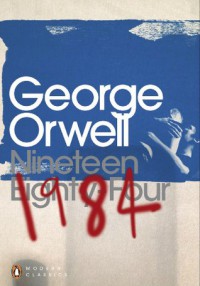 The legend of George Orwell's '1984' dates back to almost seventy years now, but hasn't lost its relevance or power. It's one of those rare, extremely dense novels that is overflowing with important ideas, and should have its place in everyone's bookshelf.
The legend of George Orwell's '1984' dates back to almost seventy years now, but hasn't lost its relevance or power. It's one of those rare, extremely dense novels that is overflowing with important ideas, and should have its place in everyone's bookshelf. Boy, Winston Smith isn't very lucky, is he? His wife is nothing but an empty shell, the world around him is one big lie and he can only talk to his actual love interest Julia by risking his life. However compelling the story might be, '1984' is primarily an essay on the dangers of revolution and oligarchy. The main reason you feel for Winston and Julia is because of the society they live in. Many words have been written about this society, so I won't bore you with the details.
It suffices to say that '1984' is more than some book every high school scholar in America has to read. Even though I knew the plot inside and out, I was still impressed by the poignant way in which Orwell manages to put his ideas into words. A book worthy of the title 'classic'.
De handel in emotionele goederen / druk 1
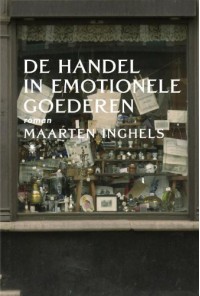 Reading Maarten Inghels' debut novel 'De handel in emotionele goederen' was not really what I'd hoped for, since I kept waiting for the story to become gripping (which, in the end, didn't really happen for me). I feel as if I've read a blueprint for a story. 'De handel in emotionele goederen' is relatively short at 206 pages (with quite a few blank ones included) and I can't help but feel the story could do with a bit more body.
Reading Maarten Inghels' debut novel 'De handel in emotionele goederen' was not really what I'd hoped for, since I kept waiting for the story to become gripping (which, in the end, didn't really happen for me). I feel as if I've read a blueprint for a story. 'De handel in emotionele goederen' is relatively short at 206 pages (with quite a few blank ones included) and I can't help but feel the story could do with a bit more body.Luukas Kolibri practices one of those professions most of us hardly think about; he clears the houses of the deceased, sells the valuables and makes sure the house is presentable for future purposes. Occasionally, we also get to read a diary transcript of a sick, older man called René Demeter, who later turns out to be one of the people whose house has been cleared by Luukas. This is a good premise for a story, but I felt as if this book suffered from the same lack of soul I've seen in a lot of other recent Belgian novels. Perhaps this is just me. Perhaps I do not understand this condensed form of storytelling. Maybe, just maybe, I'm not up to speed any more on what kind of book justifies slogans such as '... slaat in als een komeet' (as Max Temmerman states on the cover of Inghels' debut).
It has been some time, though, since I've read a book that dares to be ambitious. I've read a lot of decent stories, but none of them seem to be willing to go overboard. (Even the writing of [a:Herman Brusselmans|187328|Herman Brusselmans|http://d202m5krfqbpi5.cloudfront.net/authors/1286826931p2/187328.jpg] has a tendency to become stale after a while.) And even though the lack of a Belgian Fight Club-esque novel isn't the mistake of mister Inghels (whom I respect a lot, specifically for his 'Eenzame Uitvaart' initiative) I felt almost obliged to mention this at least once.
I guess this makes 'De handel in emotionele goederen' one of many decent novels. It could have been a lot more, I think (maybe if the Robin character was actually likeable?) but for now, I'm glad there's a new name in Belgian fiction, and I'd encourage Maarten Inghels to keep up the efforts.
 One, two, punch. This book was hypnotising for a variety of reasons. First of all, I have to acknowledge the fact that Eugenides is a very brave man. Writing a debut novel isn't an easy thing to do, let alone a debut novel that talks about the suicides of five underage girls.
One, two, punch. This book was hypnotising for a variety of reasons. First of all, I have to acknowledge the fact that Eugenides is a very brave man. Writing a debut novel isn't an easy thing to do, let alone a debut novel that talks about the suicides of five underage girls. This is also the first book I've read that uses a 'we' perspective. A very simple idea, but it works wonders for the book, as it points all the focus towards the Lisbon girls. The mysterious, infatuating Lisbon girls. It's a very fine line, really. I'm glad Eugenides hasn't made the girls mythical beings. Suicide should never be a statement; this would be a form of supreme decadence, and I'm glad he has ended on a critical note in this book. This isn't really a book that is to be understood. Giving the Lisbon girls an ulterior motive for their suicide would have been a dangerous thing. Give them a too convincing reason to die, and you risk inspiring people.
But what a great debut. The Lisbon girls really come to life, father Lisbon seems powerless, mother Lisbon willing but failing to make a difference. It's very peculiar how these characters, who are hardly ever allowed to speak in the book, are more alive than most characters I've encountered in other books. The few times they show their personality gives you very mixed feelings since Eugenides doesn't let your forget that in the end they must all die.
That's really all I can say; just read it.
PS; I haven't seen the movie adaptation, and frankly, I don't really plan to. I'm not here to compare, but seriously, I'm quite sure the book is better.
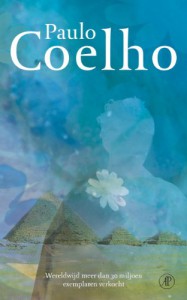 This is basically a fairy tale, in a sense that it is entirely symbolic and linear. And even though we all have good memories of fairy tales, they are fairly hard to pull off when targeted at adults. The most notable example is probably [b:The Little Prince|157993|The Little Prince|Antoine de Saint-Exupéry|http://d202m5krfqbpi5.cloudfront.net/books/1367545443s/157993.jpg|2180358] by [a:Antoine de Saint-Exupéry|1020792|Antoine de Saint-Exupéry|http://d202m5krfqbpi5.cloudfront.net/authors/1330853515p2/1020792.jpg]. Coelho's 'The Alchemist' tries to do something similar, but it's just not very gripping.
This is basically a fairy tale, in a sense that it is entirely symbolic and linear. And even though we all have good memories of fairy tales, they are fairly hard to pull off when targeted at adults. The most notable example is probably [b:The Little Prince|157993|The Little Prince|Antoine de Saint-Exupéry|http://d202m5krfqbpi5.cloudfront.net/books/1367545443s/157993.jpg|2180358] by [a:Antoine de Saint-Exupéry|1020792|Antoine de Saint-Exupéry|http://d202m5krfqbpi5.cloudfront.net/authors/1330853515p2/1020792.jpg]. Coelho's 'The Alchemist' tries to do something similar, but it's just not very gripping.The main philosophy is quite interesting, but has been discussed at length already in other media. The basic idea is that one should fulfill his or her own legend, by listening to the signs that come from Above and by becoming one with The Soul Of The World. 'The Alchemist' is really too short to go into this at length, which results in a rather vague philosophy. This is, of course, a remark one could make about most philosophical movements. The problem with 'The Alchemist' is that it's just presented in a rather stale manner. I'm sure this book would have been a lot more interesting ten to twenty years ago.
Which doesn't mean this book is absolute rubbish. It's really quite lovely (if you like moralising stories about how to live your life) and interesting (if you haven't ever considered the idea that all things might be connected). Perhaps this book serves best as a reminder. Of what, I'm not particularly sure, but I'm sure it has something to do with God and fatalism. Oh well. Onwards with my own Legend.
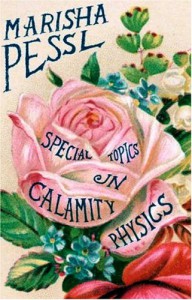 Q. - Marish Pessl is a very smart woman and has read a lot of books. She also has a lot of very smart observations and knows how to write a nice passage. To do this, she uses literary words and references smart people. Yes, Marisha Pessl is a very good writer. T/F?
Q. - Marish Pessl is a very smart woman and has read a lot of books. She also has a lot of very smart observations and knows how to write a nice passage. To do this, she uses literary words and references smart people. Yes, Marisha Pessl is a very good writer. T/F?A. True-ish? First of all, miss Pessl reveals her own genious with the vivid perversity of a stripper called Destiny removing all her undergarments at a strip club in Los Angeles. (You see that, Marisha? I can produce a simile as well!). I can understand that this works to the frustration of many, especially those who have once aspired to become a writer as well. It's true she could have dosed her literary escapades with a bit more caution, but nevertheless, her writing is unique and engaging. Even though there are times I thought miss Pessl should just shove certain metaphors back into her bra, she succeeds in what very few writers can do with their debut - finding and presenting a new literary voice.
How I wish I could say the same thing about the story! The more I tried to ignore it, the more it became clear that miss Pessl has obviously also read that other great debut novel, [b:The Secret History|29044|The Secret History|Donna Tartt|http://d202m5krfqbpi5.cloudfront.net/books/1327733397s/29044.jpg|221359] by [a:Donna Tartt|8719|Donna Tartt|http://d202m5krfqbpi5.cloudfront.net/authors/1266896997p2/8719.jpg]. The premise of a fascinating teacher that has a band of scholars following their every move reappears here. But most of all - the characters seem to do so as well. They have the same profile, play a similar role. This means miss Pessl's debut novel immediately finds itself on thin ice. I was one of those people who read 'The Secret History' and absolutely loved it. It's a timeless novel, a triumph of romanticisms and psychological insight. It's friendship. It's beautiful.
'Special Topics in Calamity Physics' is, in this equation, pretty much the same story, but it feels so much more lonely and bitter. Blue van Meer is a strange protagonist. I felt as if she erupted when she should have stayed quiet and hushed when anger was more appropriate. Her over-analytic person is supposed to be caused by her dad. I get it, really, I do. But it does provide Pessl with some very handy excuses to skip over weaker parts of the plot. It helps her comment on her own story, through one-liners that supposedly come from Blue's dad Gareth. It all felt a little flawed to me. As did the final chapter. I don't like authors meddling with the readers opinion. I like open endings as much as the next bloke, but really, I don't need an evaluation of the story I just read. That's all up to the reader, really. After all, if nobody has ever read it, how can one even know it's a book. The reader has the power. The chapter names were a bit forced as well. I suppose they represent the reading list that Blue's Dad gives her. I suppose it's symbolic, since these represent a learning curve for Blue, as does the story she is connecting to these books. Still, this wasn't very clear, and felt a bit gimmicky.
This sounds like a lot of complaints, but to tell the truth, I was really fascinated by this book. It took on a lot of responsibility, it had a vision, which I find to be lacking in many recent novels. The writing was brilliant; sometimes even a little bit too much so, since it eclipsed the story at numerous occasions. The resemblance to 'The Secret History' is a double-edged sword, really. In part, I'm really glad there's now another novel like it. At the same time, Donna Tartt did it better in my opinion. That's all I'll say about it. Obviously, the story isn't exactly the same, and nobody can really 'own' a certain type of mystery story.
'Special Topics in Calamity Physics' feels like drinking soda in literary world dominated simply by water. It's fresh, it's exciting, but takes some getting used to. However, I do admit; I was hooked, and Marisha Pessl has a great future ahead of her.
De witte tijger / druk 1
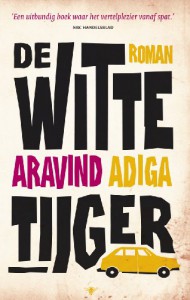 I'm not sure whether all the information provided in 'The White Tiger' is really correct. Adiga has obviously chosen an approach that is packed with social criticism. I haven't listed all the small attacks on India, but you can take my word for it; Adiga does not like what is going on in his country.
I'm not sure whether all the information provided in 'The White Tiger' is really correct. Adiga has obviously chosen an approach that is packed with social criticism. I haven't listed all the small attacks on India, but you can take my word for it; Adiga does not like what is going on in his country.The story of Balram Halwai is supposed to be symbolic for this. Again, I'm hesitant to accept this story as being representative, although I'm sure that at least some of it is right. Balram tries to escape the caste system of India and get higher up the social ladder, and his endeavours are somewhat problematic to say the least. It reminded me of such picaro novels as [b:La vida del Lazarillo de Tormes|61794|La vida del Lazarillo de Tormes|Anonymous|https://d202m5krfqbpi5.cloudfront.net/books/1170593015s/61794.jpg|362] or [b:The Adventures of Gil Blas|7480592|The Adventures of Gil Blas|Alain-René Lesage|https://d202m5krfqbpi5.cloudfront.net/books/1347768135s/7480592.jpg|9592435], this time in an Indian jacket.
Although decent and occasionally rather funny, it's not a world-changing story, and because the tone used by Adiga to describe India is so vicious, I don't really think I'm in the right place to fully appreciate this book. I know virtually nothing about India. For those of you who have been there: what was your image? And does it comply with the image sketched by Adiga in 'The White Tiger'? I'd be interested to know.






